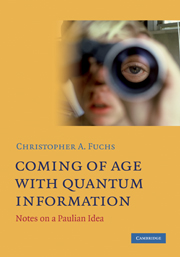Book contents
- Frontmatter
- Contents
- Foreword
- Introduction to the Cambridge University Press Edition
- Introduction to the Original ArXiv.org Posting
- Disclaimers
- Acknowledgements
- 1 Letters to David Baker
- 2 Letters to Howard Baker
- 3 Letters to Howard Barnum
- 4 Letters to Paul Benioff
- 5 Letters to Charlie Bennett
- 6 Letters to Herb Bernstein
- 7 Letters to Doug Bilodeau
- 8 Letters to Gilles Brassard
- 9 Letters to Jeffrey Bub
- 10 Letters to Carlton Caves
- 11 Letters to Greg Comer
- 12 Letters to Charles Enz
- 13 Letters to Henry Folse
- 14 Letters to Bob Griffiths
- 15 Letters to Adrian Kent
- 16 Letters to Rolf Landauer
- 17 Letters to Hideo Mabuchi
- 18 Letters to David Mermin
- 19 Letters to David Meyer
- 20 Letters to Jeff Nicholson
- 21 Letters to Michael Nielsen
- 22 Letters to Asher Peres
- 23 Diary of a Carefully Worded Paper: More Letters to Asher Peres
- 24 Letters to John Preskill
- 25 Letters to Joseph Renes
- 26 Letters to Mary Beth Ruskai
- 27 Letters to Rüdiger Schack
- 28 Letters to Robert Schumann
- 29 Letters to Abner Shimony
- 30 Letters to Jon Waskan
- 31 Letters to Bill Wootters
- 32 Letters to Anton Zeilinger
- 33 Other Letters
- Postpartum
- Index of Names
22 - Letters to Asher Peres
Published online by Cambridge University Press: 05 October 2012
- Frontmatter
- Contents
- Foreword
- Introduction to the Cambridge University Press Edition
- Introduction to the Original ArXiv.org Posting
- Disclaimers
- Acknowledgements
- 1 Letters to David Baker
- 2 Letters to Howard Baker
- 3 Letters to Howard Barnum
- 4 Letters to Paul Benioff
- 5 Letters to Charlie Bennett
- 6 Letters to Herb Bernstein
- 7 Letters to Doug Bilodeau
- 8 Letters to Gilles Brassard
- 9 Letters to Jeffrey Bub
- 10 Letters to Carlton Caves
- 11 Letters to Greg Comer
- 12 Letters to Charles Enz
- 13 Letters to Henry Folse
- 14 Letters to Bob Griffiths
- 15 Letters to Adrian Kent
- 16 Letters to Rolf Landauer
- 17 Letters to Hideo Mabuchi
- 18 Letters to David Mermin
- 19 Letters to David Meyer
- 20 Letters to Jeff Nicholson
- 21 Letters to Michael Nielsen
- 22 Letters to Asher Peres
- 23 Diary of a Carefully Worded Paper: More Letters to Asher Peres
- 24 Letters to John Preskill
- 25 Letters to Joseph Renes
- 26 Letters to Mary Beth Ruskai
- 27 Letters to Rüdiger Schack
- 28 Letters to Robert Schumann
- 29 Letters to Abner Shimony
- 30 Letters to Jon Waskan
- 31 Letters to Bill Wootters
- 32 Letters to Anton Zeilinger
- 33 Other Letters
- Postpartum
- Index of Names
Summary
June 1997, “Painting My Stripes”
I am just returning from the library, where – completely by accident – I ran into and read an entertaining little article: A Peres, “Einstein, Gödel, Bohr,” Foundations of Physics15(2), 1985, 201–205. I was especially entertained by your closing line, “Any attempt to inject realism in physical theory is bound to lead to inconsistencies.” Do you have any other writings (beside the AJP paper with Zurek) where you expand upon the ideas presented in this?
In connection to this, I have another question. If I recall correctly, you once told me that you finally came to grips (“interpretationally,” that is) with quantum mechanics in 1986. (Perhaps I have the year wrong, but that's part of the question.) Would you be willing to expand upon that point? In particular, was your arrived-at comfort founded upon the line I quote above?
I suppose I ask these questions for several reasons, perhaps the strongest of which is a renewed dilettante interest in the foundations of quantum theory. Among other things, I am trying to plan (or dream up!) a talk for the Hull conference in September to be titled something like: “Quantum Information Theory's Implications for the Foundations of the Quantum as a Whole.”
My own pet “idea for an idea” (as Wheeler would say) is that the quantum theoretical description – along with its Hilbert-space structure – is forced upon us when the information we have about a physical situation/system is of a certain variety.
- Type
- Chapter
- Information
- Coming of Age With Quantum InformationNotes on a Paulian Idea, pp. 287 - 325Publisher: Cambridge University PressPrint publication year: 2011



